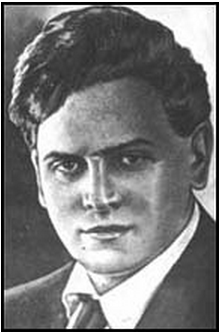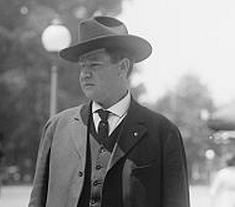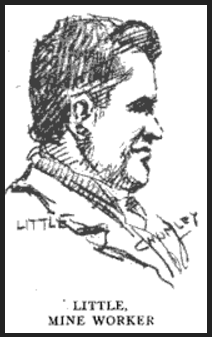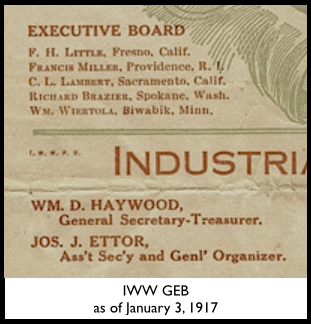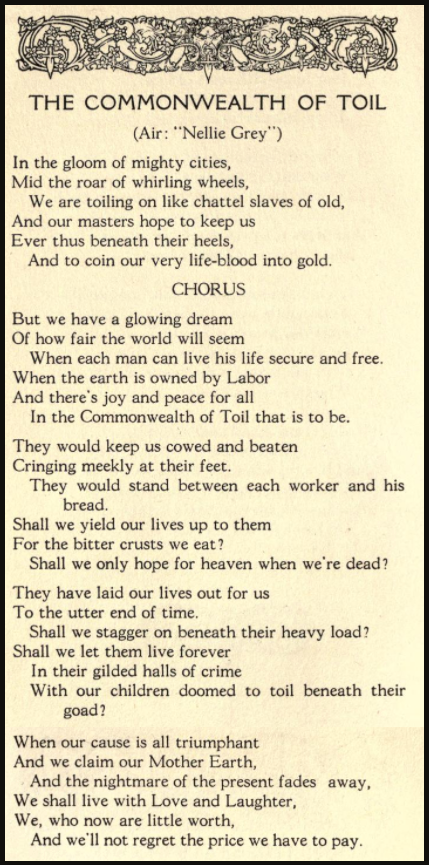Don’t worry, Fellow Worker,
all we’re going to need
from now on is guts.
-Frank Little
Hellraisers Journal, Wednesday July 25, 1917
Butte, Montana – “Agitators” Support Striking Miners
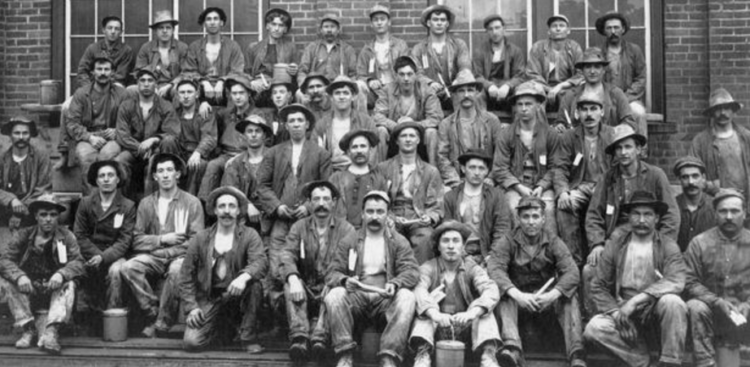
The Anaconda Standard, voice of the Anaconda Copper Mining Company, declared recently that the “agitators” of Butte are “against everything.”
Yet the striking miners have made it quite clear exactly what they stand against-i.e., the blacklist (Rustling Card system), long hours, low wages, and unsafe working conditions such as led to the deaths of 168 copper miners in the Speculator Mine Fire Disaster just a few short weeks ago.
From the Anaconda Standard of July 23, 1917:
AGITATORS TALKING AGAINST EVERYTHING
—–A mass meeting for miners of the Butte district, held last evening at the ball park, was attended by about 2,000 men. All the speakers urged the miners to stay out and said the modifications of the rustling card and the weekly pay day announced by the Anaconda Copper Mining company on Saturday should be disregarded.
Joe Shannon made a fiery speech in which he urged every miner to start picket duty today, and he remarked that the Campbell union [Butte Metal Mine Workers Union] had the “number of every miner now working.”
R. L. Dunn, strike leader of the electricians, who had pledged the miners the electricians would not go back to work until the miners were underground, said the papers had called him an I. W. W. and he would admit it.
[Said Dunn:]
This strike is an expression against the form of society which allows a few to control the wealth of the nation and a protest against the system of society which keeps workingmen from enjoying the comforts and good things of life.
Religion Buncombe.
The speaker said the ruling class from the early days of history had used various tricks to fool the workers and he said religion had been preached to the workers with the result that the only good resulting had been the creating of jobs for some men.
Said Dunn:]
Religion has been used by the employing class to teach the workers humility and meekness on the part of the workers only so they will be subservient, and may be religion is one reason why the workers are not better united.
Against Prohibition
Prohibition was another bit of buncombe, Dunn said.
The prohibitionists say liquor causes poverty, but the reverse is true. The employer wants prohibition because temperance makes more dependable workers and as efficiency increases less men are wanted to do the same work. This makes for poverty. Government regulation to the employer means regulation of government.
Charles Gildea made an attack on the international union representatives who are in Butte and called them professional labor leaders who would be better off at home. He also attacked certain leaders of the labor organizations locally.
Frank Little, the executive board member of the national organization of the I. W. W., who remarked during his last speech here that soldiers were armed thugs and who threatened action by the I. W. W. that would keep the soldiers so busy here they could not get to France, sat on the platform, but did not speak.
Frank Mabie, socialist, congratulated the miners on their refusal to go back and urged them to continue on strike.
Campbell, who was chairman, said the electrical workers had given the miners’ union $1,000. that patriotic organization, the Pearce-Connolly club, has adopted resolutions indorsing the strike. The resolutions are signed by Mike Ferriter, president, and Joe McNulty, secretary. The Pearce-Connolly club is and Irish independent organization.
———-
SOURCES
Frank Little and the IWW:
The Blood That Stained an American Family
-by Jane Little Botkin
University of Oklahoma Press, May 25, 2017
https://books.google.com/books?id=gBskDwAAQBAJ
Granite Mountain-Speculator Mine Fire
(Note: the exact death toll is still not clear, ranging from 163 to 168. The number 168 is from the memorial.)
http://usminedisasters.miningquiz.com/saxsewell/granite_mountain.htm
Anaconda Standard
(Anaconda, Montana)
-July 23, 1917, page 8
(Note: I do my best to remain unemotional while writing HJ, but I must say that reading the mocking tone of the Company Newspaper, discounting the miners demands for justice as “agitators” being “against everything,” and this only a few weeks after 168 of their fellow workers perished in an unsafe mine, well, I have no words fit to publish, only curses.)
http://www.genealogybank.com/
IMAGE
Metal Miners, Butte MT, Mining Artifacts, date unknown
http://www.miningartifacts.org/MontanaMines.htm
See also:
Tag: Granite Mountain-Speculator Mine Fire of 1917
https://weneverforget.org/tag/granite-mountain-speculator-mine-fire-of-1917/
Hellraisers Journal, Wednesday June 20, 1917
Butte, Montana – Metal Miners Organize and Strike
Butte Metal Miners Form New Union & Issue Demands; Spontaneous Walk-Out at Elm Orlu Mine
Last Meeting of Ralph Chaplin and Frank Little
The following account of the last time Ralph Chaplin saw Frank Little alive is from Chaplin’s autobiography written many years after after the death of Frank Little. Some of the dates are mistaken and have been corrected using Botkin (see link below) as a source. Jane Little Botkin is the great grand niece of Labor Martyr Frank Little. The definitive life story of Frank Little, and the long journey to Remembrance for his family, has at long last been written.
From Wobbly by Ralph Chaplin, 1948:
In the early spring of 1917 harvest stiffs were joining the I.W.W. Agricultural Workers Organization at the rate of five thousand a month. Similar gains were soon reported by organized I.W.W. loggers in the Northwest and among the copper miners of Butte and Arizona. Longshore and other maritime unions were growing rapidly, as were I.W.W. organizations in the oil fields and construction camps. The “One Big Union” was coming into its own at last, but the war hysteria was going great guns also. Every day headlines about I.W.W. activities in key industries became more threatening as the war situation became more ominous. Members wrote in by the thousands, asking about the organization’s official stand on the war.
The truth of the matter was that no stand had been taken. There was considerable rank-and-file sentiment in favor of militant action against any form of conscription for the “capitalist war,” but our men were being drafted every day. It became obvious that the G.E.B. would have to take a definite position. Board members, scattered all over the country, were recalled for an emergency session to consider the matter.
[The GEB met from June 29, to July 6th for general business and from July 7 to July 9 to discuss the IWW position on war, which three days were not included in the Synopsis. Present at the meeting were William Wiertola, Richard Brazier, Charles L. Lambert, Francis D. Miller, and Big Bill Haywood.
-See JLB, page 424-note #13: “Synopsis of Minutes of Meeting of General Executive Board, Held June 29th-July 6, 1917.”
-See JLB, page 262: “However, three additional days of meetings, July 7 through July 9, were unrecorded. Their purpose was to draft a statement defining the organization’s position on war.”]
Frank Little was the first to arrive.
[See JLB, page 260: FL arrived in Chicago on June 28th.]
This time he was on crutches. One leg was in a plaster cast. There had been an automobile accident in Jerome, Arizona, where he had been directing I.W.W. organization in the copper mines of the Southwest.
[See JLB, pages 257-8: on June 17th FL was in Bisbee attending the last day of the MMWIU Convention. He left Bisbee by auto on June 18th heading for Globe. The accident occurred early June 19th near Bowie, AZ. Frank was in the hospital at Miami until June 20th.]
But Frank wore his Stetson at the same jaunty angle, and his twisted grin was as aggressive as ever. The General Executive Board went into session. Three days they deliberated without reaching an agreement. At the end of the third day they were still deadlocked. Bill Haywood sent for me, hoping that an appeal from the editor of Solidarity would result in an agreement of some sort. I explained that readers of the official I.W.W. publication were demanding to know the official position of the I.W.W. in regard to the draft and that Solidarity’s deadline demanded an end to the deadlock. I reminded them that at Rockford an entire I.W.W. local, rather than register for the draft, had marched in a body to the police station demanding arrest.
[See The Minneapolis Morning Tribune of July 7 1917: “136 Draft Evaders Give Themselves Up. I. W. W. and Socialists Parade in Rockford [Illinois] Street to Office of Sheriff.”-link below.]
“You must agree on some policy at once,” I insisted. But it was no use. “Some of these two-eyed bastards on the board want to run the show,” said Frank Little. Everybody laughed, but none changed his mind. Frank Little, Bill Haywood, and Dick Brazier were each blind in one eye. But even the one-eyed were not unanimous.
“If we oppose the draft, they’ll run us out of business,” insisted Brazier.
“They’ll run us out of business anyhow,” snapped Frank Little. “Better to go out in a blaze of glory than to give in. Either we’re for this capitalistic slaughterfest, or we’re against it. I’m ready to face a firing squad rather than compromise.”
Bill looked angry, the others bewildered. As the deadline was at hand, I scribbled out a compromise statement. I asked permission to publish it in Solidarity. In it I.W.W. members were advised to register for the draft but to sign as “I.W.W. opposed to war.” The board refused to indorse the statement but told me to “go ahead and print the damn thing” over my own signature. I not only printed the statement in the next issue of Solidarity but I went to my draft board and registered that way.
[See JLB, page 263: RC’s statement re the draft was published in the July 28th edition of Solidarity.]
The next morning, July 25, Frank Little hobbled up to my office to say goodbye.
[See JLB, page 277: FL traveled from Chicago to Salt Lake City on about July 11th to meet with Grover Perry of the MMWIU. He left Salt Lake City heading for Butte on July 16th.]
He was still disturbed about the action of the board. “You’re wrong about registering for the draft,” he insisted. “It would be better to go down slugging.”
Frank was leaving that day for Butte, Montana, to direct the organizational drive on Anaconda Hill. I marveled at his courage in taking on a difficult and dangerous assignment like that in his present condition.
“It’s a fine specimen the I.W.W. is sending into that tough town,” I chided him. “One leg, one eye, two crutches-and no brains!”
Frank laughed. He lifted a crutch as though to crown me with it. “Don’t worry, fellow-worker, all we’re going to need from now on is guts.”
That was the last time I saw Frank Little alive….
[Emphasis added, photographs and drawings added.]
—–
What the Wobblies stood for in 1917
-and still stand for today.
SOURCES
Wobbly:
The Rough-and-tumble Story of an American Radical
-by Ralph Chaplin
University of Chicago Press, Jan 1, 1948
Chapter 18-War, pages 208-9
https://books.google.com/books?id=n-ygPQAACAAJ
Frank Little and the IWW:
The Blood That Stained an American Family
-by Jane Little Botkin
University of Oklahoma Press, May 25, 2017
https://books.google.com/books?id=gBskDwAAQBAJ
The Minneapolis Morning Tribune
(Minneapolis, Minnesota)
-July 7 1917
https://www.newspapers.com/image/181520177/
IMAGES
Ralph Chaplin
http://spartacus-educational.com/USAchaplin.htm
Big Bill Haywood, WDC, 1915
http://www.loc.gov/pictures/item/hec2008004218/
IWWC 1916, Delg Little
IWWC 1916, Wiertola, Brazier, Lambert
(Sadly, I could not find an image for FW Francis Miller despite much searching, more research needed.)
From: “The Tenth Annual I. W. W. Convention” by Leslie H. Marcy, ISR Jan 1917
https://books.google.com/books/reader?id=SVRIAAAAYAAJ&printsec=frontcover&output=reader&source=gbs_atb&pg=GBS.PA406
IWW GEB as of Jan 3, 1917
http://garagecollective.blogspot.com/2010/12/little-packet-containing-ashes-of-joe.html
Commonwealth of Toil by Ralph Chaplin, Leaves 1917
https://archive.org/stream/whenleavescomeou00chapiala#page/4/mode/1up
Commonwealth of Toil by Joe Glazer
-Lyrics by Ralph Chaplin
Bonus song: the Wobbly Dream by Joe Hill
We Will Sing One Song
Performed by Six Feet In the Pine
Organize! Oh, toilers, come organize your might;
Then we’ll sing one song of the workers’ commonwealth,
Full of beauty, full of love and health.

